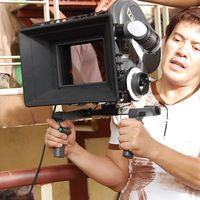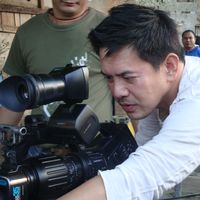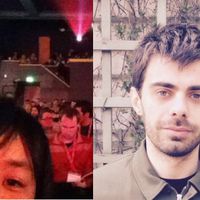Parlez-Vous Francais?
22-year old Raya Martin is at the forefront of a resurgent cinematic movement in the Philippines. On the strength of his atmospheric short film “Bakasyon” (The Visit), his feature-length documentary on the Itbayat tribe of Batanes “Ang Isla Sa Dulo ng Mundo” (The Island at the End of the World), and his graduate thesis “Infancia En Las Islas De Filipinas, Sin Fecha.” (Childhood In the Philippine Islands, Undated.), he was selected to participate in the 11th edition of the Cannes Cinefondation residency for first and second time filmmakers. I talked to Raya about his experiences at the residency, differences in working styles between himself and filmmakers from western countries, and, how the effect of spending time in Europe and attending film festivals has influenced him as a filmmaker.Raya Martin having breakfast at the Cinefondation apartment.
1) You spent October 2005 – March 2006 in France as part of the Cannes Cinefondation residency. What was the residency like?
Basically what the residency gives you is a comfortable accommodation in Paris for a good four and a half-month session to write and prepare a project. The residence is located in an impressive neighborhood in the 9th arrondisement, with the eventfulness of Pigalle and Montmartre but in the security of a private compound. The apartment is packed with amenities. Each of the six filmmakers in a session have their own private bedroom equipped with a computer and internet connection, a television and a VCR. There's also a shared DVD player, and a common video room that everyone may use. It's more of a house than an apartment; with less hassles of living independently, especially since you get housekeeping visits regularly. The residence also provides an allowance of 800 euros per month, French lessons with a private teacher who visits you at the apartment, access to important and useful theatres. The schedule is very much relaxed. There are meetings with producers and institution contacts, but they are scheduled and consulted well with you.

Native Children Witnessing an Eclipse
2) How did your experiences in production differ from those of the other residents? Were there marked differences between the Asian residents and the Western ones?
The other residents, mainly from Europe or with European backgrounds like Australia and Argentina, are used to a long timetable of production. I produced my first feature (“Ang Maicling Pelicula Nang Ysang Indio Nacional” / A Short Film About the Indio Nacional, an expansion of his student thesis) and shot it in 5 days, with almost negligible budget in foreign terms. Most of the other shorts and feature were prepared for months, even years, and production and post-production would take a considerable amount of time. Of course there were technical differences, like shooting on digital versus film, editing on a non-linear platform…
I would also say there's a different degree of meticulousness between Asian and European productions. At least in the Philippines, most of the films are prepared and put together in a few months time, but during production there is also a different kind of focus that filmmakers have to attend to. Also, I thought there's a particular innovativeness this side of the world, because of obvious constraints in budget and resources, so that filmmakers tend to find, or are pressed for, original solutions to last-minute problems. I think this is what makes a number of Asian productions interesting.
On the other hand, western productions seemed to be bound by some kind of strictness, such as unions and regulations, that producers and directors adhere to known procedures. And because foreign film institutions are stricter with them, they are used to preparing for things well ahead, so that their productions seem to go smoothly. Of course it varies from one project to another.
I remember one of my co-residents was always mentioning about how their national film commission was hard to convince [to support] his project, which was in a way unusual to most of the commercial films being released in their country. It's the same for any other country; that you can't rely much on the government. Even in films, I guess.

Native Bellringer
3) How do you feel the Asian and European aesthetics differ? Do you see any similarities between them?
Personally, I don't know how you would define Asian versus European aesthetics. In the Philippines, we are mainly influenced by Hollywood style of filmmaking, so a bulk of our films are cheap genre imitations. There's a lot of hybrid as well, in both Asian and western sensibilities, so that, say a Vietnamese film can be a French film set in an Asian backdrop. Also, the conventional idea that European filmmaking equates to sophistication whereas Asian films have a rawness to them is kind of problematic. It might be only true in terms of production values.
Our stories are as different as they are similar. It's like meeting strangers in foreign lands and sitting down talking about experiences. You are overwhelmed by learning of their different experiences, and the next thing you know, you're relating personal stories that sound familiar to each other.

St.Nino and the Belringer engaging in a duel
4) An aspect of your residency is to introduce you to French producers for possible co-productions. How do you feel about Asian/European co-productions? How do you feel about the idea that a certain 'Asianess' lost, in the attempt to reach out to European markets?
It's good that there's more Asian-European co-productions coming out, the same way [that it’s good when] more people get to travel around, interact with other people, share things… I guess there may be a problem when a project is forced to fit into this system. I'd like to think it's better to establish the project first before looking for someone to co-produce it with.
Also, it's scary how people have a tendency to be purists in this issue of Asian-ness. The reality is that worlds are opening up, people are moving, and experiences are changing. There will always be history as much as there will always be change.

The Cinfeondation Residence
5) That's interesting, your comments about how purists are a bit scary and the world is opening up. What are your thoughts on the cosmopolitan life of a contemporary filmmaker (assuming his films are accepted by festivals and he travels often, as you are doing now with your films)?
It's a struggle to balance having that sense of a national history and the fact that the idea of the nation is being redefined and challenged by technological possibilities. The issue of mobility should be considered now more than ever, especially considering we are in an age that communicates in vastly different ways, through new technology, and this largely defines a people's taste, influences their culture, regard for things, attitudes, etc. Like I said, it's a struggle to keep a balance between confronting this reality and maintaining a sense of history. One is as important as the other. One has to stick to his roots in as much as one must remain open up to new possibilities.
6) You attended the Berlinale Talent Campus in 2005. That was your first trip outside of the Philippines. How many festivals have you attended since, and how has this affected you as a filmmaker?
I've probably been to a handful of festivals, from Cannes as an observer, to Rotterdam, Slovenia, Yamagata, San Francisco, Vienna, and Hong Kong with my films. With the exception of San Francisco, most of the festivals have been in Europe. It bothers me quite a bit, thinking about this before, how the idea of friendship works in this kind of world. You make friends in festivals, residencies, and the timeframe is relatively short, but the intensity is somehow as influential as, say, childhood friends. It's a new and special type of relationship (also a new phenomenon). I don't really know how to deal with something like it.
For me, there are advantages and disadvantages with traveling to film festivals. I get to see exciting works from all over, not just being limited to what we have here (mostly pirated DVDs, whose selection has gotten wider in recent years, but is limited nonetheless). I also get to interact with other people, talk about different experiences, ideas, approaches to filmmaking…
But this kind of lifestyle admittedly has some effect on the ego. Like how one should work on his or her next film. And because festivals have such a specialized audience, it creates in the mind of a filmmaker a conception (or misconception) about the reception to their films. And the mind can be very playful and tricky. I didn't want to work on anything right away after returning.
7) What are your plans from here?
I've just finished my script for the residence, which is called "Independencia", a family drama set in the woods during the American occupation in the early 1900s. I'll soon be starting on working, hopefully, for a co-production.
by Alexis A. Tioseco, a film critic and curator based in the Philippines. He teaches film in the Arts Department of the University of Asia & the Pacific, and is the founder and Editor-in-Chief of www.Criticine.com, an online journal of Southeast Asian Cinema.
Similar content
By Kerrine Goh
25 Nov 2005
By Kerrine Goh
12 Feb 2012
By Kerrine Goh
30 Nov 2011
By Kerrine Goh
11 May 2016
By Kerrine Goh
05 Nov 2004



